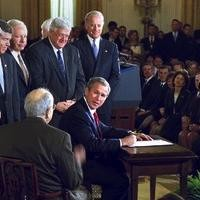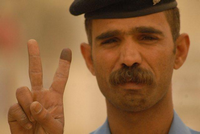The Interpreter has published a very powerful and moving letter from a reader and Afghanistan war veteran that’s really worth reading. Along with this post by Robert Farley, it serves as a junction between what had been two parallel threads I’ve been following on the myth of “antiseptic war.” One, to which the reader was responding, has to do with the relation between video games and networked war, which Sam Roggeveen discussed here. The other has to do with COIN and population-centric warfare, and specifically the misconception of it as a “kinder and gentler” form of war, which Michael Cohen […]
Iraq Archive
Free Newsletter
I just started browsing through this new publication from the Strategic Studies Institute, “Short of General War,” and found the chapter on al-Qaida and RMA by Lt. Col. Thomas Graves thought-provoking. Graves runs through the goals of the 1990s RMA and subsequent Donald Rumsfeld-era “transformation” and suggests that al-Qaida represented a pretty close approximation of the ultimate RMA-inspired military organization, which Stephen Biddle described as “a leaner, faster, higher-technology force that exploits the connectivity of networked information to outmaneuver, outrange, and demoralize enemy forces without requiring their piecemeal destruction in close combat.” That got me thinking about the tactical-strategic rap […]
A couple of inter-related items on the ongoing shifts in military doctrine and theories of war managed to jolt me out of a self-imposed blogging hiatus (needed to catch up on organizing upcoming feature issues). The first thing that caught my eye was this post over at Information Dissemination on the U.S. Marine Corps’ experiment in company-size autonomous units. I’d noticed this back in December and wondered whether it might not prove an even more lasting impact of our current wars on the U.S. military than the COIN doctrine being applied to fight them. The network of autonomous small units […]
NewsHour’s Gwen Ifill interviews New York Times reporter Rod Nordland who is on the ground in Baghdad where violence has been on the rise. Nordland says that recent attacks targeting civilians bare the mark of Al Qaida, but no one has yet claimed responsibility. While some observers suggest that the attacks are an attempt to keep U.S. forces engaged in combat, U.S. troops on the ground have left the management of the recent aggression to Iraqi forces, pressing forward with their timetable for withdrawal. All of this is happening as the Iraqi government works quickly to create a coalition government […]

When asked for his assessment of the French Revolution’s historical impact, Zhou Enlai famously replied, “It is too early to tell.” Historians are fond of citing the quotation, but at times ignore its fundamental insight: that they often arrive at their judgment of historical events prematurely. Nowhere does this seem truer than in the case of America’s controversial intervention in Iraq. For most historians, the narrative of the Iraq War terminates decisively with failure in 2006, even as the chronology of its costs is generously extended decades into the future (e.g., the famous $3 trillion estimate). Meanwhile, any successes — […]

Five years ago, in an essay in National Interest, Paul Saunders and I attempted to address the question of what victory in Iraq would look like. We concluded that success would include depriving al-Qaida of a base, closing Iraq’s borders to foreign fighters, and the emergence of a central government capable of ensuring some degree of stability, without repressive methods or too close an alignment with Iran. “Americans and others will recognize victory,” we wrote, “if we have managed to break the back of al-Qaida in Iraq and left in place an Iraqi government committed and able to prevent the […]
